
To the Colossians, preoccupied with legal codes and intellectual disputes, Paul wrote a letter stressing not only the centrality of Christ but also the need for Christians to live out their faith in genuine community. Paul's antidote to a privatised and intellectualised faith will provide relief to many Christians today.
To Philemon, a powerful church leader, Paul wrote a strong personal letter asking him to embark on a new relationship with his slave Onesimus. Drawing on insights from Scott Bartchy, Robert Wall argues that the issue had more to do with power relationships than with slavery. As a model for conflict resolution and mutual relations within the Christian community Paul's letter has much to offer the church today.
In this careful study of Colossians and Philemon, readers will find introductions that discuss the letters' occasion and purpose, authorship and other background information, as well as important theological themes. Passage-by-passage commentaries follow, that seek to explain what each letter means for us today as well as what it meant for its original hearers.
To Philemon, a powerful church leader, Paul wrote a strong personal letter asking him to embark on a new relationship with his slave Onesimus. Drawing on insights from Scott Bartchy, Robert Wall argues that the issue had more to do with power relationships than with slavery. As a model for conflict resolution and mutual relations within the Christian community Paul's letter has much to offer the church today.
In this careful study of Colossians and Philemon, readers will find introductions that discuss the letters' occasion and purpose, authorship and other background information, as well as important theological themes. Passage-by-passage commentaries follow, that seek to explain what each letter means for us today as well as what it meant for its original hearers.



